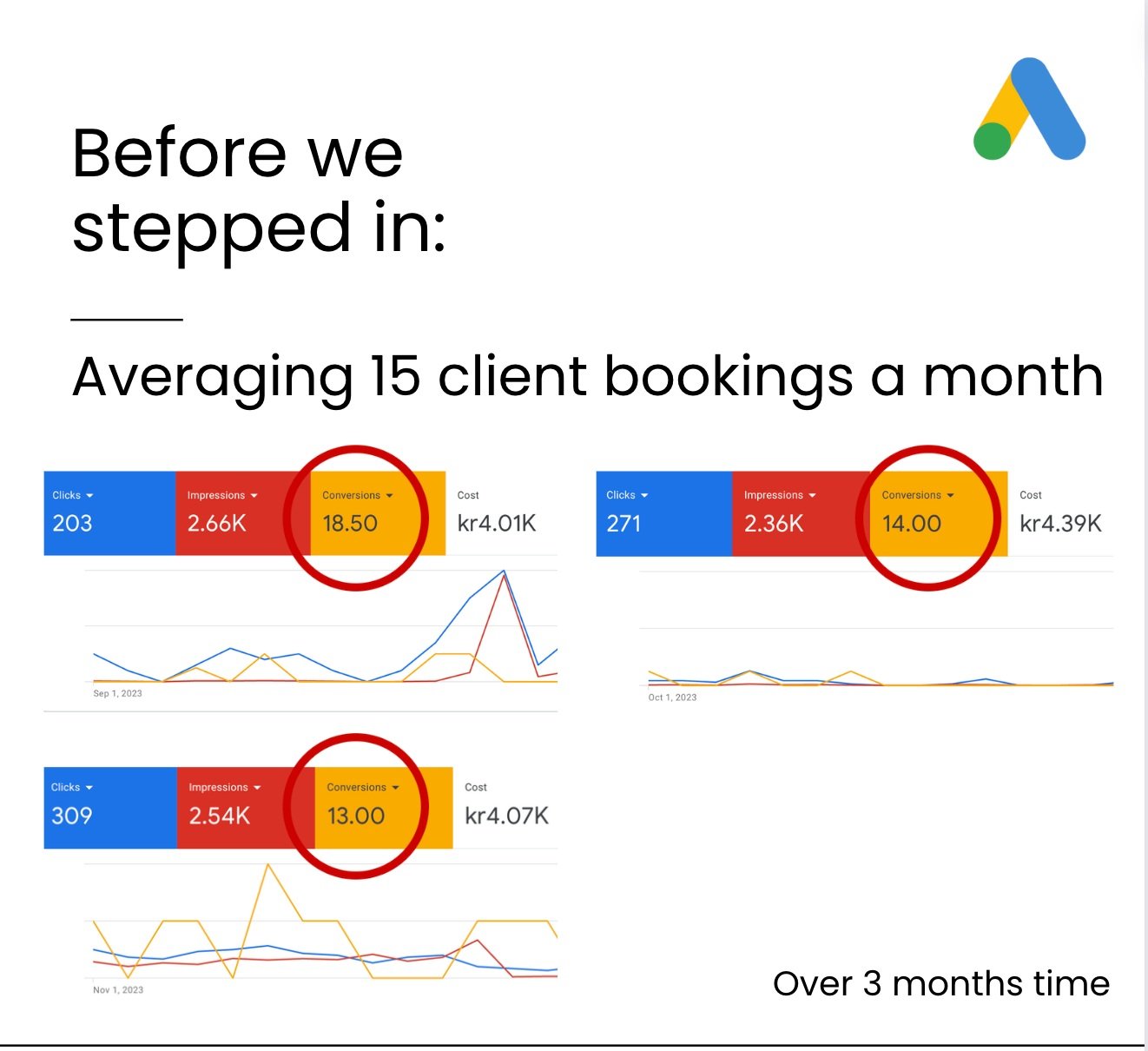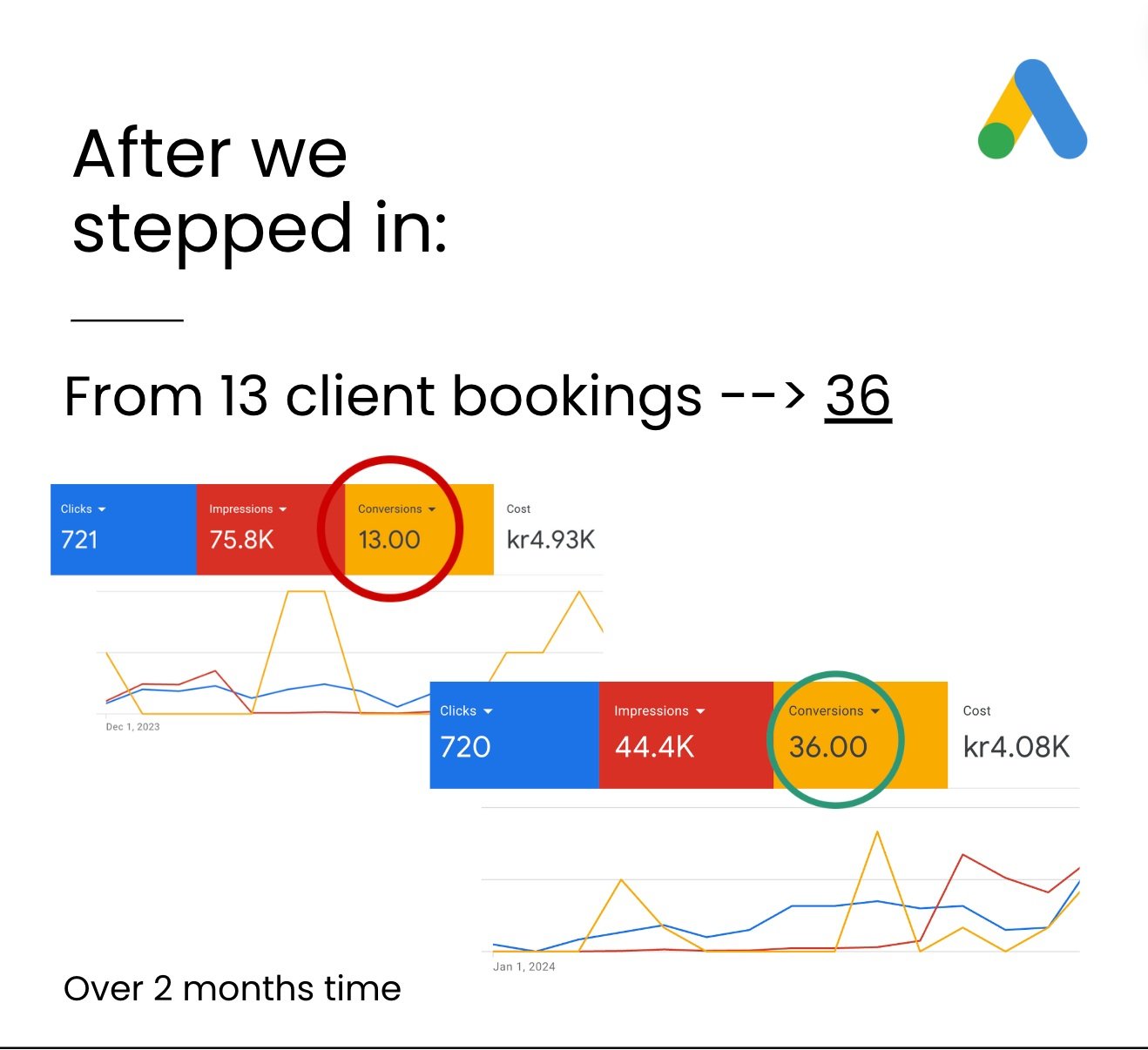Maximizing Google Ads for Psychologists: A Case Study and Tips
As a psychologist, you understand the intricacies of the human mind and behavior. However, when it comes to reaching potential clients online, navigating the world of Google Ads might seem like uncharted territory. Fear not, for with the right strategies and insights, you can enhance your online presence and attract more clients effectively. Let's delve into some tips tailored specifically for psychologists and how our experience has been with digital advertising for psychologists.
-Note; I am writing this especially for psychologists, but it can, by any means, be used in a lot of different scenarios, so go ahead!
Case Study: Elevating Bookings with Strategic Google Ads
Here is one of our cases on a psychologist in Denmark:
Before partnering with us, one of our psychologists was averaging 15 bookings per month on Google ads. While this was alright, he wanted more and respectable, there was room for improvement. In the initial month of collaboration, during the learning phase, the bookings dipped slightly to 13. Most importantly however, we got a bunch of good data from our tests and knew how to handle the upcoming month. Patience proved to be a virtue as January came rolling in and we witnessed a staggering increase to 36 bookings by the end of the month.
How was this achieved? How did we go from 13 the month before, to 36?? Certainly, timing played a role, as January tends to witness a surge in individuals seeking psychological support. People are feeling down. They're Googling stuff about anxiety and depression and feeling low. The key is to reach the right people at the right time. Recognizing the heightened prevalence of anxiety and depression during winter, the marketing strategy pivoted accordingly. By proactively aligning ad campaigns with seasonal trends and staying attuned to audience needs, the psychologist experienced remarkable growth in bookings.


Above you can see the data from our client 3 months before we started working together and the results 2 months after.
Tips for Psychologists Navigating Google Ads
1. Understand Your Audience:
Dive deep into the demographics and psychographics of your target audience. What are their pain points, interests, and preferences? Tailor your ad messaging to resonate with their needs and emotions.
2. Leverage Seasonal Trends:
We have found that this is very imporant for psychologists. Capitalize on seasonal fluctuations in demand for psychological services. Whether it's the holiday blues or New Year resolutions, align your ad campaigns with prevailing sentiments to maximize relevance and engagement.
3. Embrace Patience and Testing:
Rome wasn't built in a day, and neither are successful ad campaigns. Adopt a mindset of experimentation and refinement. Test different ad creatives, keywords, and targeting parameters systematically. Monitor performance metrics closely and correct them based on data-driven insights. This can really take time!
4. Optimize Landing Pages:
A compelling ad is only half the battle won. Ensure that your landing pages are optimized for conversion. Keep them concise, user-friendly, and aligned with the ad's messaging. Incorporate clear calls-to-action (CTAs) to encourage bookings or inquiries.
- Note: This we learned the hard way - the landing page is very imporant. We once had a client that didn’t have the best website at all and poor landing pages. This lead to us having good stats on the ads, but not any conversions. This makes testing almost impossible, as the ads seem to be working great, but you just aren’t getting conversions. This you? Then the landing pages are a very good place to start making changes.
5. Harness the Power of Remarketing:
Don't let potential leads slip away. Implement remarketing campaigns to re-engage users who have previously interacted with your website or shown interest in your services. Personalize your messaging to nurture these prospects through the conversion funnel.
6. Stay Updated and Flexible:
The digital landscape is ever-evolving, and so should your advertising strategy. Keep abreast of industry trends, algorithm changes, and best practices. Remain agile and adaptable to pivot your approach as needed to stay ahead of the competition. You have to very proactive and it is also important to keep the momentum going, once you finally get it going!
In conclusion, mastering Google Ads as a psychologist requires a blend of empathy, strategic thinking, and a willingness to iterate and learn. By leveraging data insights, seasonal dynamics, and a patient, iterative approach, you can elevate your online visibility and connect with those in need of your expertise. Remember, success may not happen overnight, but with persistence and strategic finesse, your practice can thrive in the digital arena. You got this!